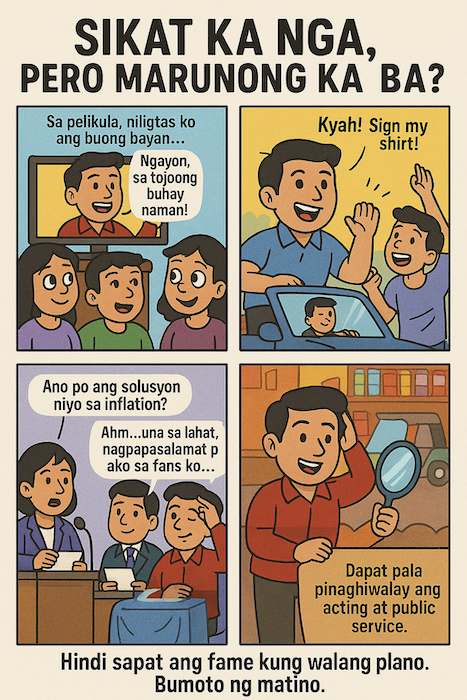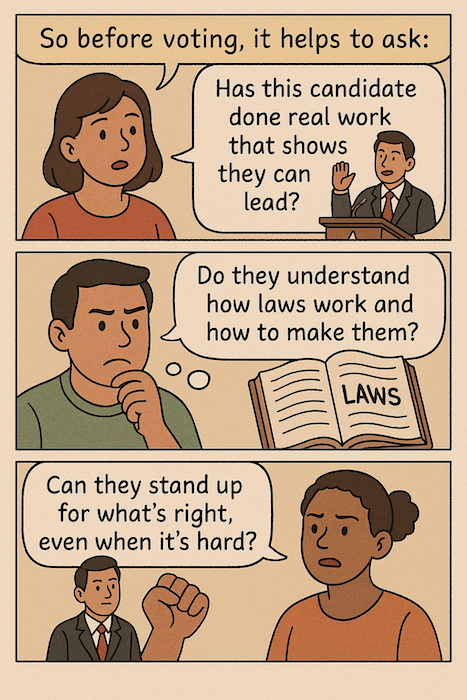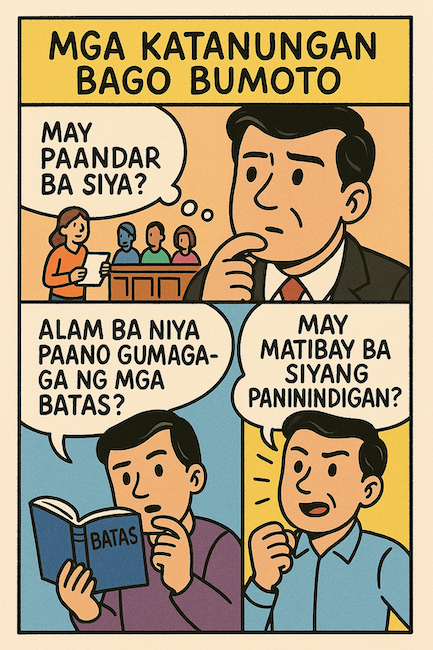Navigating the limelight: Celebrity politics and voter choice in the 2025 Philippine Senatorial Election

The 2025 senatorial race shows us something that’s been true for a long time: being a celebrity still gives candidates a strong advantage. Many of those leading in the surveys are either from showbiz, well-known media personalities, or closely linked to powerful political families. While this isn’t new, it says a lot about how voters decide who to support—especially in a country where media exposure and name recall can easily shape public opinion.
Why Familiar Faces Still Win
In a country where many voters don’t always have access to in-depth political information, a familiar face can go a long way. People tend to trust names they’ve heard before or see often on screen. This is where celebrities and media figures have the edge.
There’s also the emotional connection that builds over time. When someone like Bong Go appears regularly in community projects like the Malasakit Centers, or when the Tulfo brothers help solve problems on their shows, people begin to feel they know them personally. They seem approachable and relatable—not just politicians, but people who care.
Listen: Philippine Voter Psychology and Election Dynamics
As one analysis on X by @zryanverse put it, voters are often drawn not just to someone who sounds smart but to someone who seems warm and genuinely concerned. Candidates like Go and Tulfo aren’t just seen as public servants but as people who “have your back.” To truly understand why certain candidates succeed, just look beyond preconceived notions and stereotypes like “corrupt yan” and instead try to understand who these candidates are and, more importantly, how they connect with voters on an emotional and personal level.
Why the Senate Matters
But while star power might win votes, being a senator isn’t just about being liked. The Senate has a lot to do with what the laws of the country are. It can review the work of the executive branch, call witnesses to testify and pass laws that impact people’s daily lives. If we vote people like me into office who lack the knowledge, experience, or commitment to do a good job, it’s not just my career that’s in jeopardy, it’s the quality of our governance. A Senate of personalities, not professionals, may look good on camera but will not be up to the demanding work the country now needs.
What Really Drives Voter Choices
Some people complain that voters make poor choices or are easily fooled by celebrity names. But it’s not always that simple. Filipino voters do think—they just don’t always prioritize the same things political observers might expect. Emotion, connection, and trust play a big role. For many, it’s not just about platforms or degrees. It’s about whether a candidate seems sincere and relatable.
That’s also why some experienced candidates struggle. People might respect their work, but if they come across as distant or hard to relate to, they face an uphill battle. And for top-ranking candidates, joining debates might even seem risky. If they’re already leading, they may think there’s nothing to gain by stepping into a debate where they might get challenged.
What Can Voters Do?
With the 2025 elections fast approaching, voters have an important choice to make. Popularity isn’t always a bad thing—but it shouldn’t be the only thing. We all want leaders who are kind and relatable, but we also need them to be capable, honest, and ready to handle the responsibilities that come with the job.
So before voting, it helps to ask:
– Has this candidate done real work that shows they can lead?
– Do they understand how laws work and how to make them?
– Can they stand up for what’s right, even when it’s hard?
This means being more active—looking up reliable sources, asking tough questions, and not just accepting what’s shown on social media or TV. We need senators who are not just famous, but ready to serve and make the country better.
The Bottom Line
Celebrities and well-known figures will continue to have a place in the Philippine government. But this election is an opportunity to aim higher. We can still vote for someone we like — but let’s?also vote for someone ready, willing and able to do the work. Ultimately, our future depends on who we elect to the Senate.



